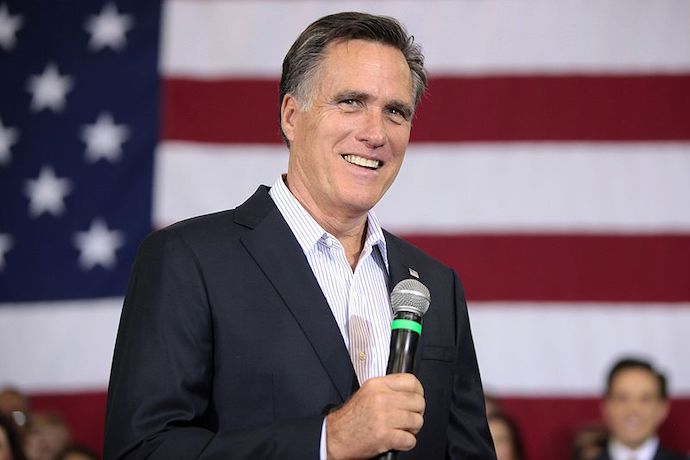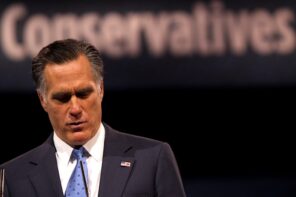So it turns out that at least some Republican leaders only care about faith when it moves the needle in their direction. Mitt Romney claimed that his Mormon faith had a lot to do with his vote to convict Pres. Trump on the first article of impeachment—abuse of power:
Romney, a devout member of the Church of Jesus Christ of Latter-day Saints, described to me the power of taking an oath before God: “It’s something which I take very seriously.” Throughout the trial, he said, he was guided by his father’s favorite verse of Mormon scripture: Search diligently, pray always, and be believing, and all things shall work together for your good. “I have gone through a process of very thorough analysis and searching, and I have prayed through this process,” he told me. “But I don’t pretend that God told me what to do.”
…Romney’s decisive break with Trump could end up hurting him even in Utah, a red state where the president is uncommonly unpopular. What that means for his reelection prospects, the senator couldn’t say. (He doesn’t have to face voters again until 2024.) But as he thought about it, another hymn came to mind. “Do what is right; let the consequence follow,” he recited. “And I don’t know what all the consequences will be.”
Trump and his defenders got on high pissy-face about that. “I don’t like people who use their faith as justification for doing what they know is wrong,” the president sniffed (literally). “Nor do I like people who say ‘I pray for you’ when they know that’s not so,” an apparent swipe at Nancy Pelosi. Fox & Friends, being who they are, were quick to get Trump’s back:
[Fox & Friends co-host Brian] Kilmeade balked at the suggestion that Romney’s faith had to do with his conviction vote.“For him to bring religion into this… [it] has nothing to do with religion,” he said. ‘My faith makes me do this?’ Are you kidding? What about your faith and this case meld together? I mean, that is unbelievable for him to bring religion into this. ‘His faith.’ … To me, it has nothing to do with faith.”
You get the idea. Banning abortion and outlawing homosexuality is all fun and games until someone loses an impeachment vote. Then suddenly the GOP is extremely concerned about keeping faith out of politics and also policing what is and isn’t authentic faith.
But take Kilmeade at face value for the sake of conversation. What about Romney’s faith and this case meld together?
It’s possible that they don’t in fact meld together, that Romney was simply being disingenuous in saying his faith motivated his vote. But logical parsimony indicates otherwise. There would not really be much advantage to lying about this. Claiming Mormonism as the deciding factor probably won’t win Romney much support; in fact, it might cost him some. It certainly wouldn’t be a get-out-of-jail free card within his own party, as evidenced above. So possible, but not necessarily probable.
Another argument is that Romney, like many Mormons, has been turned off by the President’s lack of [ahem] interpersonal moral hygiene. You hear this one a lot when evangelicals are discussed as well. But while it’s true that Utah gave Trump his smallest margin in any state he won, he is overall still pretty popular with Mormons, especially Mormon men. It’s also true that Trump’s moral failings haven’t prevented Romney from solidly backing his agenda to this point. Let’s put a pin in this one, too.
A more fun (but more outlandish) theory is what’s often referred to as the “White Horse Prophecy“: the idea that “the Constitution of the United States will hang by a thread and a Mormon, or group of Mormons, will save the nation.”
Neat. Like most prophecies, though, it’s vague enough to be more or less all-purpose: it could have been claimed by Ammon Bundy and his crew (many of them staunch LDS members) just as easily as Romney. But like most prophecies, it also falls flat under much scrutiny. Admittedly, the Constitution isn’t in great shape these days, but is it really “hanging by a thread”? Could Romney have believed he would be the one to save the nation? It seems unlikely. The man’s a U.S. Senator. If there’s anything he knows how to do, it’s count votes. Surely he knew he would be a lonely voice in voting to convict the president of his own party.
But the prophecy above mentions something with actual explanatory power. Mormons believe the U.S. Constitution and Declaration of Independence to be divinely inspired documents that articulate universal principles of “justice and equality before the law,” according to former LDS leader Gordon B. Hinckley. The Book of Mormon relates that Jesus said as much in his visit to America.
It would be easy to make fun of the idea that God tucked the United States away for untold eons until the time was right to fill the Founding Fathers with the Holy Spirit to guide them through the process of writing our nation’s guiding documents. And surely many will make fun of it. It seems outlandish, to put it mildly. But in the words of the Mormon legal scholar Dallin H. Oaks,
Perhaps the most important of the great fundamentals of the inspired Constitution is the principle of popular sovereignty: The people are the source of government power. Along with many religious people, Latter-day Saints affirm that God gave the power to the people, and the people consented to a constitution that delegated certain powers to the government. Sovereignty is not inherent in a state or nation just because it has the power that comes from force of arms. Sovereignty does not come from the divine right of a king, who grants his subjects such power as he pleases or is forced to concede, as in Magna Charta. The sovereign power is in the people. I believe this is one of the great meanings in the revelation which tells us that God established the Constitution of the United States,
“That every man may act … according to the moral agency which I have given unto him, that every man may be accountable for his own sins in the day of judgment.
“Therefore, it is not right that any man should be in bondage one to another.
“And for this purpose have I established the Constitution of this land.” (D&C 101:78–80.)
In other words, whatever opinion one has of the Church’s positions, the official teaching of the Church of Latter-Day Saints is that God desires all people to live in egalitarian democracy, not under the oppression of violence, or under the whims of a lone tyrant. The point of that desire, in turn, is to allow individuals to live and make decisions freely, because they will be held accountable for those decisions.
So, what about Romney’s faith and the case of Trump’s impeachment meld together? You’re looking at it. Donald John Trump abused his power, and in so doing, took away from the sovereignty of the people. Mitt Romney voted to regain that sovereignty, and to hold Trump accountable. This has everything to do with Romney’s faith, and you know what? It doesn’t seem so wrong.





